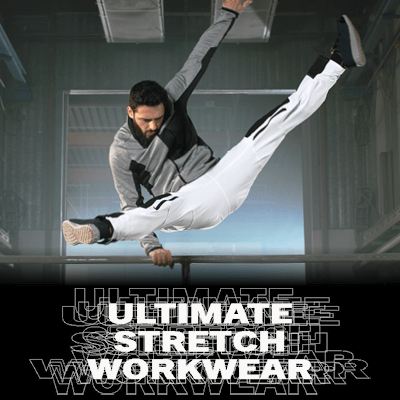Fabrics
Choose the fabric best suited to your work
Do you work in warm or cold environments? Maybe you work outdoor in the rain, near running machines or in an environment in which you are exposed to flames and sparks? It is crucial that you are properly dressed for the work you do. When choosing workwear, it is therefore important to consider which fabric quality suits your needs. MASCOT uses more than 100 different fabric qualities, each of which is chosen because of its unique properties. Which fabric quality or material combination is the most ideal for you depends on your industry and the environment that you work in.
Workwear
MASCOT’s workwear is manufactured in many different materials, all of which are chosen in order to give the clothes the best comfort, durability and breathability for the different work situations. Read more about the most common fabric qualities below, and learn more about which particular material to choose.
Cotton - 100 % Natural Material
A fabric of 100% cotton achieves some very special properties because it is a pure natural material. Cotton is soft and very comfortable to wear. It is washable at up to 95 degrees C. Workwear made from pure cotton is a must for employees that work near embers.
Canvas - Durable canvas with a rough look
Canvas is a weaving structure that creates a fabric with a rugged, cool look. Durability is high and in fabric quality 010 (used in both MASCOT® YOUNG and MASCOT® HARDWEAR) there is a bit of stretch in the fabric. This is particularly noticeable when you kneel, and the trousers give a little. Quality 010 is 310 g/m², the heaviest of MASCOT’s canvas fabrics in polyester / cotton. Should you require lighter, fabric quality 154, with a weight of 260 g/m², is an attractive alternative.
Twill - A great hit
Quality 430 is one of MASCOT’s most sold fabrics. It is just as useful now as it was 10 years ago, and has a variety of uses for different disciplines in both industry and tradesmen. A mix of polyester and cotton creates a robust fabric which effectively keeps its colour and shape even after frequent washing and drying. Quality 430, at 310 g/m², is the heaviest of MASCOT’s twill fabrics in polyester / cotton. Should you require lighter, there are several alternatives: Quality 442 with 270 g/m², Quality 330 with 245 g/m², and Quality 230 with 205 g/m².
Quilt - Warm thermal wear
Quilted products are known for being warm and insulating and have, for many years, been used as an insulating layer in many industries. MASCOT thermals are available in several thicknesses and colours. The quilt consists of three layers - between the two wear-resistant outer layers is a polyester inner layer that provides insulation. The three layers are welded together ultrasonically ensuring fabric of high quality and high durability.
Footwear
Do you prefer safety shoes of leather, nylon or textile? At MASCOT, the materials for the production of safety footwear are assessed within parameters such as durability, comfort and breathability. Read more about the most utilised materials here so that you can determine which safety footwear fits your work situation the best.
Leather
Leather is a natural material that has been used for shoemaking for many years. Leather is a great material for the manufacture of safety footwear, as it is comfortable, durable, breathable and insulating. You can find shoes of leather, among other things, in the ranges MASCOT® FOOTWEAR INDUSTRY and MASCOT® FOOTWEAR FIT. These shoes are designed especially for the environments that place additional demands on the shoes. Therefore, if you daily crawl on a cement floor, work outdoors during the cold months, weld or work near hot coals, then safety shoes of leather are the obvious choice for you. Leather should be cared for regularly with impregnation in order to protect it and extend the service life of the shoes.
Textile
Textiles are made from either natural or man-made fibres and are used for many purposes within particularly the clothing industry and the furniture industry. Textile is great as lining in shoes as it feels soft and comfortable against the foot. But durable textiles can also be used on the outer part of a shoe if you prefer breathable shoes. Textiles for shoemaking are especially known from sneakers and athletic shoes, in which an upper part of textile is combined with a flexible sole so that the shoes are lightweight and provide good movement of the foot. At MASCOT, you can find safety shoes of textile, among other things, in the ranges MASCOT® FOOTWEAR FLEX and MASCOT® FOOTWEAR ENERGY.
Polyamide
Polyamide is also called nylon and is a thermoplastic material. Polyamide is often used as a compounding material along with other synthetic materials. The benefits of polyamide as a fabric quality are that it is extremely durable, quick drying and it soaks up more moisture than other non-organic fibres. This makes nylon extremely useful for lightweight and breathable safety shoes that do not need to be resistant to extreme heat. Polyamide, among other things, is used in the MASCOT® FOOTWEAR FLEX range. Due to the durable and quick drying properties, polyamide is an obvious choice for the ones working outside during the warm months.





















